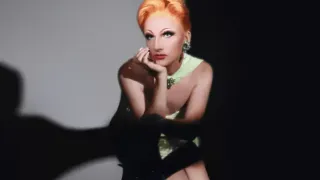
3 hours ago
A Twink’s Tango with Intimacy: “A Few Feet Away” Peels Back Buenos Aires’ Queer Nightlife
READ TIME: 3 MIN.
It’s a familiar sight for many LGBTQ+ people: the blue-lit glow of a phone screen, the endless parade of faceless torsos, and the dopamine rush of a new notification. For Santiago, the protagonist of “A Few Feet Away,” this isn’t just nightlife—it’s life itself. Tadeo Pestaña Caro’s latest film, premiering at BFI Flare Festival and soon arriving digitally, immerses us in the Buenos Aires queer scene where the boundaries between desire, isolation, and self-discovery blur with every swipe and refresh .
Santiago, played with aching vulnerability by Max Suen, is a 20-year-old gay man whose daily routine is dictated by the ping of a Grindr-style app. The score is peppered with its notification sounds—a clever nod to how these platforms have become both soundtrack and lifeline for a generation of queer youth . But as Santiago flits between shadowy clubs and secret rendezvous, the thrill of instant connection is tempered by the cold reality: real intimacy remains just out of reach, always “a few feet away.”
The film refuses to take easy sides. Instead, it lays bare the risks and rewards of digital dating: *“It’s a film that carefully toes the line between vilifying the impersonality of hook-up culture and its risks while also portraying the choice it gives its users to love freely and openly,”* writes ThatFilmBlog.uk . In an era when safety and anonymity are paramount, apps are both shield and shackle. Santiago’s journey exposes how liberating and stifling queer digital life can be—the freedom to choose, the risk of losing oneself in the algorithm.
“A Few Feet Away” paints Buenos Aires as both playground and pressure cooker—a city where age politics and social dynamics shape every interaction. The film hints at the competitive, often performative nature of queer spaces: Santiago lies to friends about his hookups, chasing stories as much as encounters . In the club scenes, he’s part prey, part predator, scanning the crowd and the app for someone willing to step out from the digital shadows.
Yet beneath the surface, there’s vulnerability. Santiago is often out of his depth, slinking around nightclubs with “a reptilian quality,” as the review notes, but also longing for something more than transactional touches or fleeting glances . The city’s electric energy amplifies both his anxieties and hopes, echoing the experiences of queer youth worldwide who seek belonging in crowded rooms and empty inboxes.
The emotional resonance of “A Few Feet Away” hits hardest as the film nears its close. The club’s chaos fades; Santiago is left with the impersonality of his hookups and a gnawing sense of loneliness . In one powerful, mostly dialogue-free scene, Santiago confronts himself—a moment of introspection that resonates deeply with anyone who has ever felt lost in the endless scroll.
The film’s refusal to moralize or offer easy answers is its strength. As director Caro explained in interviews, the story isn’t just about apps or sex—*it’s about the search for authenticity in a world that commodifies connection* . For queer viewers, especially those navigating digital spaces for safety or community, Santiago’s journey is a mirror for the modern dilemma: How do we balance the promise of freedom with the cost of isolation?
What makes “A Few Feet Away” essential viewing for LGBTQ+ audiences isn’t just its candid depiction of hookup culture—it’s its refusal to flatten queer experience into either cautionary tale or utopian fantasy. Instead, it asks us to grapple with the messy, contradictory realities of digital intimacy, especially for those living in places where being out isn’t always safe.
For queer people in Buenos Aires and beyond, Santiago’s story is both specific and universal—a reminder that connection, vulnerability, and belonging remain central to our lives, no matter the platform or postcode . The film’s nuanced approach encourages viewers to interrogate their own relationships with apps and anonymity, to ask what they’re truly seeking when they log on, and what they’re willing to risk or reveal.
“A Few Feet Away” joins a growing wave of films that refuse easy binaries, instead capturing the complexity of queer life in the digital age. Its frankness recalls early Scorsese, but its heart beats with the urgency and honesty of contemporary LGBTQ+ storytelling . By spotlighting the double-edged sword of hookup apps, Caro and Suen invite audiences to step back, reflect, and—perhaps—reach out for something more.
As “A Few Feet Away” lands on digital platforms (with an “Unrated Director’s Cut” promised), its arrival is a timely invitation for queer communities to talk openly about intimacy, loneliness, and the ever-shifting terrain of connection . In a world where “distance” can mean miles or mere inches, the film reminds us that the real challenge isn’t just getting closer—but letting ourselves be seen.






